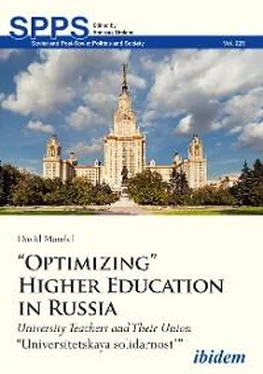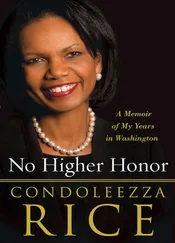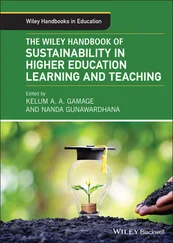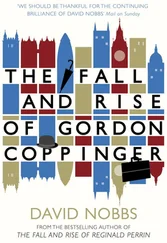The Minister of Education from 2004 to 2012 was Andrei Fursenko, a personal acquaintance of Putin from his native St. Petersburg. Fursenko was a physicist who had turned to business after the Soviet Union and then entered government service. At a pro-government youth forum in 2007, he criticized the inertness of the educational system inherited from the Soviet past, which he was intent on transforming. That system, he opined, had stubbornly tried to make young people into creators; whereas the main goal of education should be to cultivate consumers who know how to make use of technologies and innovations developed by others. 25
One of the reforms of this period was the designation of élite national research universities that received additional funding, part of the effort to promote basic research in universities and “international competitiveness.” Another programme introduced in the late 2000s and also aimed at diversification through the creation of an élite university sector was the formation of “federal universities” in Russia’s various regions. This involved the forced merger of hitherto separate, often very different, institutions, a process experienced very painfully by many teachers, who, in typical fashion, were not consulted. Along with the Moscow and St. Petersburg State Universities, that received a unique status in 2009, the élite tier eventually comprised some 60 institutions, about 12% of the public universities. 26
The advancement of Russian universities in the “international educational marketplace” became an important goal of government policy. To that end, the government signed onto the Bologna process in 2003, leading to the replacement of the traditional five-year first degree with a four-year BA, that could be followed by a two-year MA course. The higher candidate’s degree ( kandidatskaya —roughly a PhD) was, however, retained, along with the highest academic degree of Doctor. The avowed aim of this reform was to facilitate the international mobility of students and faculty. But it continues to arouse much criticism among university teachers, who complain that the resulting bachelor’s programme is merely a truncated version of the former five-year course of study that does not provide an adequate general higher education. Among other things, the bachelor’s programme is supposed to include a considerable amount of individualized student work, but the classroom teaching load of university teacher leaves them little time for individual student supervision. 27
With increased state funding for higher education, teachers’ salaries improved in the second half of the decade but remained well below the average wage in many of Russia’s regions. An international comparison found that average salaries of Russian university teachers in 2008/09 were equal to only 60% of per capita GDP, far below the level of their counterparts in the vast majority of developed, and even poorer, countries. 28“Salaries really did rise between 2001 and 2011, roughly speaking from 10,000 to 30,000 rubles,” observed mathematics teachers R. Karasev of MFTI. But that still remained far from the amount needed to feed a family.” 29
To make matters worse, in 2008 the old centrally-fixed wage scale for public-sector employees was replaced with a New System for the Remuneration of Work. This gave heads of hospitals, schools, and universities broader latitude in spending their allotted budgets. Money that they economized on designated functions could be used as incentives to stimulate the work of employees. How that was done was supposed to be negotiated with the employees. But in the absence independent trade unions, the new law gave rectors a virtually free hand. As a result, an inordinate part of the new money went to the remuneration of administrators.
A teacher of higher mathematics at the Moscow Institute of Physics and Technology (MFTI) recalled of this period: “The price of oil began to rise, and the situation became somewhat more comfortable for teachers. But we began to notice a growing disbalance. Ordinary colleagues really did begin to receive a little more, although nothing commensurate with the income Russia was taking in from oil. At the same time, the administration was beginning to make very big money. In a remarkable article, professor Pokrovskii wrote that although everyone says our work is selfless, that we are doing very important work, we are paid next to nothing, while university administrations are growing fat. Several such articles appeared at the time, as people were becoming aware of the disproportion, which by 2010-12 had already assumed an ugly form.” It was only in 2017 that the Minister of Education and Science finally recognized this as a problem, though nothing much was done. 30
The second half of the 2000s thus witnessed a deepening of the opposition between university teaching staff and administrations. Those elements of faculty participation in university governance that had appeared after the fall of the Soviet Union began to be eliminated. A 2006 amendment to the Law on Education introduced a new procedure for choosing rectors, who had until then been elected by university academic councils ( uchenye soviety ), themselves elected by the teaching staff. According to the new amendment, a government committee was to approve candidates before the election, allowing it to eliminate undesirables. In the élite national-research and federal universities, rectors were now appointed directly by the government (by the President himself, in the case of the Moscow and St. Petersburg State Universities). As a result, the choice of rector fell increasingly to “strong managers”, people with academic degrees but also with experience in business or government administration. Rectors of the élite universities are generally very wealthy individuals.
Finally, the charters of the élite tier of universities provided for the creation of new academic units to replace the traditional departments and faculties. While department directors and faculty deans are by law elected by faculty councils, the heads of these renamed units are appointed from above. Under pressure from the ministry, this change has proceeded across the university system. 31
As a result, rectors and other top university administrators became solidly integrated into the state administration’s “vertical of power”. This has been a central element in the state’s reassertion of control over higher education. In the “vertical of power”, loyalty of state functionaries is assured through a combination of reward, the source of which, at least in part, is some form of corruption, and the threat of punishment. The high salaries of rectors and other top administrators, as well as the proliferation of administrative posts in universities, are integral parts of the neoliberal “new public administration” that has been imposed upon universities in many countries over the last decades. 32The paradox, of course, is that the “free markets” and “competition” that are extolled by the policy’s promoters require muscular state intervention to create and maintain them.
The Putin regime inherited a system of higher education that was chaotic and in clear need of reform. But the new government, with the added resources at its disposal, was determined to impose its own vision of the needed changes, without consulting the parties directly concerned, university teachers, in the first instance. The reforms were undertaken without even a semblance of public discussion, let alone democratic participation, an approach that would be maintained in subsequent years.
d. 2012-18: The May Decrees and the “Road Map”
Putin’s election campaign in the spring of 2012 for a third presidential term (after a four-year pause as Prime Minister) followed upon unprecedentedly large popular protests, which were provoked, among other things, by the falsification of the previous fall’s parliamentary election results. People were also angered and insulted by the blatant cynicism of Putin’s “castling move,” whereby, in order to avoid changing the constitution, he exchanged places with President Dm. Medvedev, who had been his prime minister until four years before. This, Putin let it be known, had been planned from the very start.
Читать дальше












